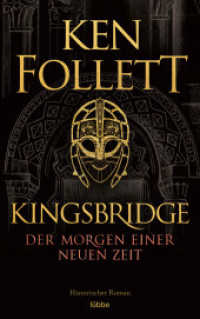- ホーム
- > 洋書
- > 英文書
- > History / World
Full Description
In the sixteenth century, members of the Ouchi family were kings in all but name in much of Japan. Immensely wealthy, they controlled sea lanes stretching to Korea and China, as well as the Japanese city of Yamaguchi, which functioned as an important regional port with a growing population and a host of temples and shrines. The family was unique in claiming ethnic descent from Korean kings, and-remarkably for this time-such claims were recognized in both Korea and Japan. Their position, coupled with dominance over strategic ports and mines, allowed them to facilitate trade throughout East and Southeast Asia. They also played a key cultural role in disseminating Confucian texts, Buddhist sutras, ink paintings, and pottery, and in creating a distinctive, hybrid culture that fused Japanese, Korean, and Chinese beliefs, objects, and customs.
Kings in All but Name illustrates how Japan was an ethnically diverse state from the fourteenth through the sixteenth centuries, closely bound by trading ties to Korea and China. It reveals new archaeological and textual evidence proving that East Asia had integrated trading networks long before the arrival of European explorers and includes an analysis of ores and slag that shows how mining techniques improved and propelled East Asian trade. The story of the Ouchi rulers argues for the existence of a segmented polity, with one center located in Kyoto, and the other in the Ouchi city of Yamaguchi. It also contradicts the belief that Japan collapsed into centuries of turmoil and rather proves that Japan was a stable and prosperous trading state where rituals, policies, politics, and economics were interwoven and diverse.
Contents
Acknowledgements
Conventions
Introduction: The Lost History of Ouchi Rule
Chapter 1. The Origins of the Ouchi
Chapter 2. The Founder Ouchi Hiroyo
Chapter 3: Ouchi Yoshihiro and the Forging of Ouchi Identity
Chapter 4. The One Who Could See Stars: The Unlikely Rule of Ouchi Moriakira
Chapter 5. Fraternal Succession, Expanding Trade, and Durable Administration
Chapter 6. Trader, Shogun, King, and God
Chapter 7. Ouchi Masahiro and the Rise of Yamaguchi
Chapter 8. Yoshioki and the Apogee of Ouchi Rule (1495-1528)
Chapter 9. The Triumphs and Tragedy of ?uchi Yoshitaka (1528-51)
Chapter 10. The Collapse
Epilogue. Legacies
Bibliography







